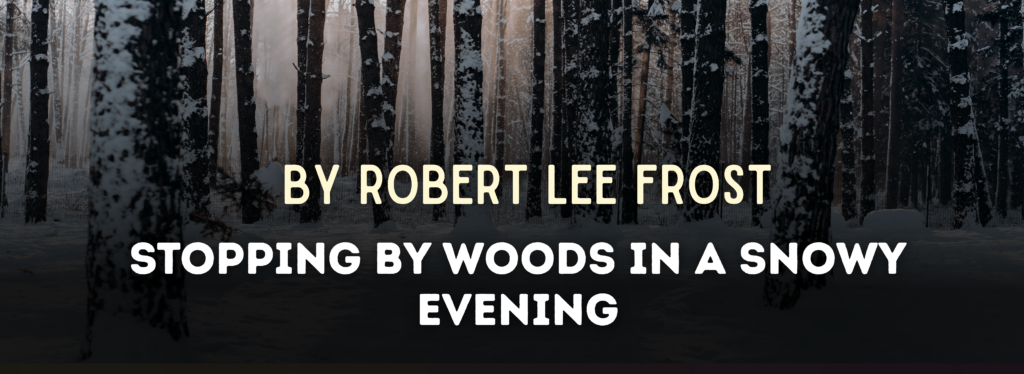Here is a detailed summary of “Stopping By Woods In A Snowy Evening” By Robert Frost.

Introduction of the poem:
Robert Lee Frost was born on March 26, 1874, in San Francisco, California, USA. He is the winner of four Pulitzer Prizes. His famous works include The Road Not Taken, Mending Wall, Birches, Nothing Gold Can Stay, etc. He told one of his friends that “Stopping By Woods On A Snowy Evening” will be his “Best Bid For Remembrance”. He died on January 29, 1963, in Boston.
Apparent Meaning of the poem:
On the surface, this poem is simple and a unique piece of writing. The speaker stops in the middle of a dense forest on a snowy evening. He is intrigued by the stunning scenery and hence is enticed to stay longer. Then he realizes he has many responsibilities to fulfil before he can rest for the night.
Hidden Meaning of the poem:
The speaker/narrator is charmed by the momentary distraction from worldly obligations, allowing himself a moment of peace. Frost is nature-loving, and he has often expressed his fondness and appreciation for beautiful nature in his poetry. In this poem, Frost grounds his character in a thick forest, mesmerized by the snowy evening. Some critics suggest that the horse is actually the narrator, or at least, in the same mindset as the narrator, echoing his thoughts. The way he personifies his horse also brings attention to the meaning.
Summary: Stopping By Woods In A Snowy Evening
“Look deep into nature, and then you will understand everything better.”
Stopping By Woods In A Snowy Evening captures the essence of a traveller’s introspective journey as he pauses to admire the serene beauty of a snow-covered landscape. The poem, “Stopping By Woods On A Snowy Evening,” begins with the traveller observing the peacefulness of the woods, which stand dark and inviting against the backdrop of falling snow. It evokes a sense of solitude and calmness, as he contemplates the allure of the world around him. At the same time, the cool wind blowing through the trees adds a gentle, serene feeling to the scene, causing the branches to sway and dance gracefully. This movement creates a paradox of tranquility and anticipation, drawing the traveller deeper into the woods’ quiet embrace. Similarly, the sight of the white snowflakes descending softly onto the ground enhances the mystical quality of the woods, transforming them into a beautiful, almost enchanting realm.
“Snow falling soundlessly in the middle of the night will always fill my heart with sweet clarity.” - Novala Takemoto.
The speaker knows whose woods he is in, but he also knows that the owner of the house has gone somewhere else. Hence, he can stay in the woods, enjoying the ravishing scene of nature without being distracted. The scene of this cold night lures him. He admits feeling transfixed by the woods, enveloped in nature’s exquisite beauty.
“One touch of nature makes the whole world kin.” - William Shakespeare
Then he introduced the readers to his companion and carrier of his journey, his horse. The horse clearly dislikes being in this dark, lonesome place filled with unsettling quietness. It may be because he prefers to stop only near warm farmhouses where animals and their riders can enjoy food, shelter, and comfort. As a result, the anxious horse shows his discomfort by moving his bells, trying to get the attention of the rider. The bells jingle playfully, revealing the horse’s inclination to leave the woods for good, which feels melancholic and solitary. This ringing of the bells brings the narrator back into reality. The only other sound besides the ringing of these bells is that of the wind and falling snowflakes, which mesmerizes the speaker.
The speaker finds the woods very alluring and compelling, but he has obligations to fulfil elsewhere. He knows there are many more miles to go. He has many promises to keep, and his responsibilities are waiting for him. His commitments pull him out of the woods and take him back to his destination.
“The woods are lovely, dark and deep but I have promises to keep”
The poet is trying to tell us that we should understand the difference between reality and imagination.
Conclusion: Stopping By Woods In A Snowy Evening
Writing a poem that can connect to everyone was Robert Frost’s expertise. This poem is one such poem that seems very simple at first glance, but as you try to understand it, you see the intricate meaning and message behind the simplicity of the poem.